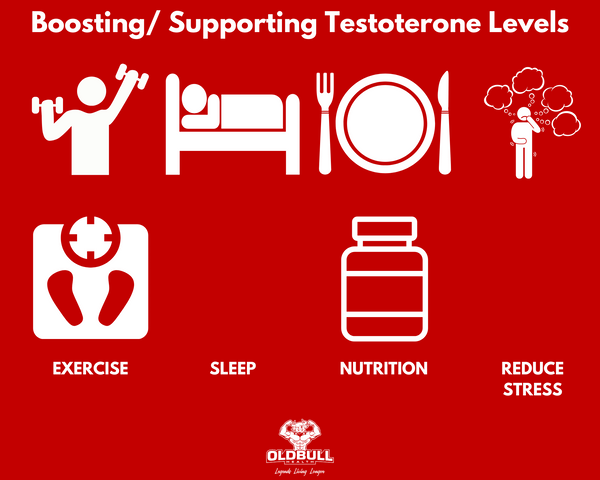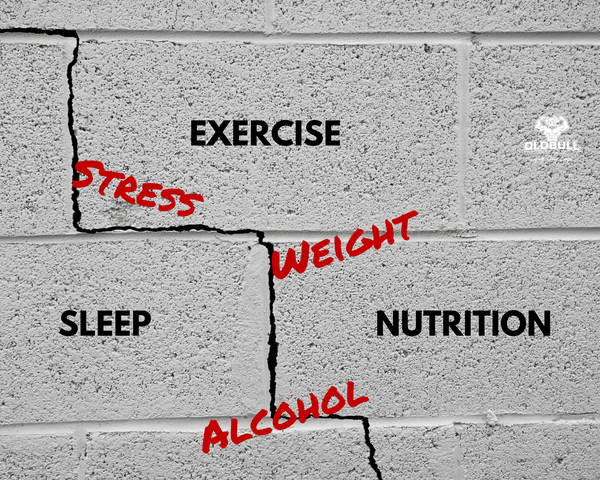Boosting Testosterone
If you understand the importance of testosterone for men, then you should be interested in finding out more about ways to help you boost, or at least maintain testosterone levels.
But...
- Testosterone levels fluctuate, even throughout the day.
- Your levels can depend on many factors, some beyond your control.
- What you want, is a healthy level, for you.
Boosting and supporting testosterone
Four key areas to consider:

Keep reading
1. Exercise and weight loss
Exercise:
Do some exercise, resistance-based training is best.
Endurance and resistance training can increase but did not sustain increased levels of testosterone. T levels increased generally within 30m after exercise but decreased after 90m. You can read the related research here.
However, the more in shape you are, the more your testosterone increases with exercise, but this increase gets less as you age.
Physically active men do show better semen parameters than sedentary men. Physical exercise obviously has other benefits as well, but supports an overall improved hormonal environment. Read the research here.
Which exercise type works best? Well, this particular study indicated resistance training is the answer. A bout of resistance training generally includes increased secretion of various catabolic and anabolic hormones including testosterone. Various factors affect this, but in general testosterone levels are elevated following heavy resistance training sessions. Read more here.
So, get exercising.
Not only can you look better naked, but studies show that the differences between regularly exercising males and sedentary males were significant.
Increased VO2 Max, testosterone and GH levels. These may also be advantageous for brain function. Read the article here.
Weight loss:
This is where the magic happens. If you are overweight or obese and you lose weight, your testosterone levels will increase.
Body fat is one of the single most important factors associated with low testosterone. Obese men have on average up to 30% less testosterone.
2. Sleep
Sleep 7-8 hours per night.
Getting adequate and quality sleep is important for testosterone production. Aim for 7-8 hours per night. Recharge and refuel. Read the sleep research here.
In this research on the effect of 1 week or sleep restriction in young healthy men, sleep resulted in a 15% increase in T levels.
Sleep times also were also found to significantly affect the variability of morning testosterone levels in elderly man. Find our more here.
3. Nutrition
Food
You are what you eat. Your Testosterone levels certainly are.
Garbage in, garbage out. Avoid processed foods and sugar.
In a NY Times article 25 fit men in age range 18-30 were given either a high fat, low carb diet or a traditional western diet. High fat was 75% calories from fats and 5% from carbs, while the other was 25% calories from fats and 55% from carbs.
Over 10 weeks T levels in the high fat diet group increased by 118 points which the other group T levels decreased 36 points. Read the article here.
Foods rich in zinc, magnesium and vitamin D such as oysters, almonds and eggs have been shown to increase testosterone levels.
Listen to the Old Bull podcast below to learn more about specific foods which can impact your testosterone levels. Free on podomatic, but also available on all podcasting platforms. just search "Old Bull Health". You can find a full list of our podcasts here.
Supplements
If you are deficient in certain nutrients, it can impact your testosterone levels negatively. Eating a balanced diet is the first option. Failing that, supplements can help fill the gaps.
Listen to the Old Bull podcast below to learn more about supplements which can impact your testosterone levels.
4. Stress!
Reduce stress.
There is a negative relationship between cortisol and testosterone. Your body reacts to stress by releasing cortisol. Read more here. So, try reducing your stress levels and the resulting cortisol to improve testosterone levels.
Hypercortisolism can suppress T secretion by a direct action on the testes. May have biological implications on the reproductive adaptation to stress.
So, in a nutshell.
You want healthy testosterone levels? Look after yourself.

